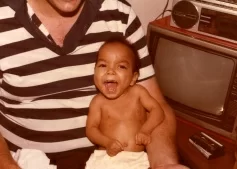 without a thought on my part. But Luke came to my mind yesterday and I looked up some information on him and discovered that his birthday had just passed. I found this old article that I wrote about Luke a few years ago. I thought I'd share it again. I am convinced that there are important and significant lessons we can learn from his life, and that I need to regularly share what I think they are. I hope you enjoy this!
without a thought on my part. But Luke came to my mind yesterday and I looked up some information on him and discovered that his birthday had just passed. I found this old article that I wrote about Luke a few years ago. I thought I'd share it again. I am convinced that there are important and significant lessons we can learn from his life, and that I need to regularly share what I think they are. I hope you enjoy this!The mysteries of God are a part of the Christian life that can often lead to confusion, doubt and even discouragement for believers.
- For some, it's a pride thing. We want to have answers – we want to understand, to be able to grasp the complexities of Biblical truth and God's plan for mankind.
- For some, God's mysteries – the unexplained things of life – are stumbling blocks to faith:
1. Why do bad things happen to good people?
2. Why does He allow pain, suffering and evil to thrive in our world?
Several months ago we were witnesses to the aftermath of the tragedy in Pennsylvania involving the Amish community, where, good, decent, hard working, non violent people were subjected to unspeakable cruelty towards their children. How can this happen?
3. One of our CSC children, who grew up in the worst poverty imaginable in Cebu City, was adopted into a family in the United States several years ago. Well meaning people would tell her how lucky she was and how God obviously had a wonderful plan for her life. She had a hard time with that and would sometimes ask her parents, "But what about all the kids who are still there, who weren't adopted, and who are still suffering and dying? What is God's wonderful plan for their lives? Why me and not them?
For many of us, we celebrate the goodness of God in our lives, we praise him for his healing, for material comforts, for blessing our efforts – even as we observe people who remain sick or disabled, who suffer in poverty – those who efforts and initiatives end in disappointment and ruin.
There are two extremes in terms of people's reactions to the things about God and life that are not understood.
1. There are those who try in vain to grasp the ungraspable – to be able to reduce the mysteries to understandable formulas or explanations. I remember a young seminarian who came to Cebu and who filled the pulpit of our church on a Sunday evening. He preached for an hour on the "peace of God that passes all understanding." Perhaps he felt that if he preached long enough he could crack that nut and open our understanding!
We all know those who have reduced the book of Revelation to precise charts and timetables, giving us easy to understand categories for all of human history and, most especially, the times to come.
2. A second category are those who shake their heads and say, "We'll only know these answers when we get to heaven." They suspend inquiry, not bothering to seek answers to the perplexing questions of life.
Living and working in a Third World country like the Philippines brings some of these mysteries to the front of our lives. Poverty, and all that goes with it, is "in your face." People often ask me "How do you like living in the Philippines?" That's a tough one to answer. Life anywhere has its highs and lows. Some days are great, others are difficult. I often answer this way:
1. When I'm sitting down to a nice breakfast I am aware that, within a few meters of my house are families that have no breakfast.
2. When I'm driving to the office or the Shelter I often pass people walking along the road who, for lack of a few cents can not even afford public transportation and must walk.
3. When I stop to buy medicine for my family or the CSC kids, there are people standing nearby whose children are dying for lack of that very same medicine.
Why am I blessed and they are not?
I recall a conversation with a missionary a few days after Cebu was hit by a strong typhoon. Many of our CSC workers lost their roofs or their entire homes. The houses of the poor were devastated by the high winds and torrential rains. The missionary said that it had been such a miracle how God spared the missionary homes from damage, holding his hands of protection around us during the storm. I remember wondering whether it wasn't more a matter of our having cement houses and strong metal roofs.
Why did our CSC kids have to suffer so much? And how much more, those who live on the street and cannot be admitted to CSC?
These are tough questions. When it comes to trying to understand our own suffering, the Bible gives some answers. For example, Romans 5:3-4 tells us that suffering produces perseverance, perseverance character, and character, hope. And the Bible gives us additional hope that we will someday come to see God's purpose and mysteries:
"But now we see through a glass dimly, but then face to face."
And we hear the testimonies of Christian brothers and sisters who have lived through terrible times and have turned negatives into positives in their lives.
Several months ago I was attending a conference in Bismark, North Dakota. One of the featured speakers was Steve Saint, Steve's father, Nate Saint, was one of the five missionaries killed in 1956 by Aucan warriors in Equador. Steve told about what that tragic day meant to his family, and what it was like when his dad, his hero, didn't come home that day. We saw video of his current family life, and saw a man who was interacting with Steve's children, and who was being referred to as "Uncle." It turns out that this was the very man who had killed Steve's father, who had come to know Jesus and had experienced the forgiveness of God and of the Saint family and now was a part of their family – an amazing story of how good things had come out of tragedy and suffering.
So the clear message is that God has a plan for our lives, we will discover that plan in the right time. He is writing our life's stories, but some of the chapters are difficult ones.
We can understand this. We can, when aided by the Holy Spirit, see how difficulties and suffering are part of a purification process for us, and that we, like Job, will eventually be better people for it.
But what about people who, because of major disabilities, are unable to understand their situation, unable to discern the hand of God or his plan for their lives. Where is the purification and growth and ultimate value for these people? What could God's purpose possibly be?
Back on 1982 a baby was born in a charity ward in a small hospital in Cebu City. 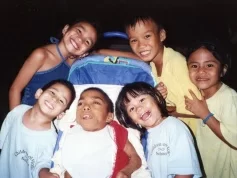 The baby underwent cardiac arrest during birth and was without oxygen for an extended time. Unlike many cases of charity patients, the hospital staff decided to resuscitate the baby, even after he had suffered massive brain damage and cerebral palsy. The baby's mother abandoned him in the hospital, and after a couple months Luke was referred to CSC. When we took him in he appeared to be a bouncing baby boy. We did not know that he would not develop physically beyond about a year and a half, or mentally beyond a few months. Luke would never speak, nor have voluntary movement of his arms or legs.
The baby underwent cardiac arrest during birth and was without oxygen for an extended time. Unlike many cases of charity patients, the hospital staff decided to resuscitate the baby, even after he had suffered massive brain damage and cerebral palsy. The baby's mother abandoned him in the hospital, and after a couple months Luke was referred to CSC. When we took him in he appeared to be a bouncing baby boy. We did not know that he would not develop physically beyond about a year and a half, or mentally beyond a few months. Luke would never speak, nor have voluntary movement of his arms or legs.
Luke became a fixture at CSC. For over 23 years he was an integral part of our lives and a symbol of CSC and what we are all about.
Many times Luke would be hospitalized – often due to upper respiratory infections. He fought for his life many times. There were at least a dozen times when we were sure that he would die. The doctors had told us that he wouldn't make it past five years old. Then they revised it to nine, then 11 – certainly he wouldn't reach his teenage years.
One time, when Luke was critically ill our staff met to pray and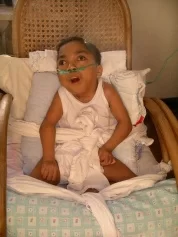 I asked them to reflect on his life. Here is why: I believe that God had a purpose for Luke's life when he created him. I believe that He uses people like Luke to teach us important things. But here is the rub: If we don't spend time reflecting on these lessons, then Luke's life is useless. Its up to us to allow God to make sense of Luke's life.
I asked them to reflect on his life. Here is why: I believe that God had a purpose for Luke's life when he created him. I believe that He uses people like Luke to teach us important things. But here is the rub: If we don't spend time reflecting on these lessons, then Luke's life is useless. Its up to us to allow God to make sense of Luke's life.
And what are the lessons that we found? What has God taught us through his life?
1. First, life is precious. Even though he had nothing to live for, from the world's point of view, Luke clung to live almost ferociously. Some of us who have much more to live for take life casually, we take life for granted. Not Luke. Every day was a struggle. Every breath had to be fought for. Life is a gift from God and we should treat it carefully.
2. God has provided us with opportunities, through Luke's life, to minister to him in significant and life-saving ways. He has provided an avenue for us to live out the biblical mandate to minister unto the "least of these," because, truly, Luke was in that category. Hundreds of people have been given a blessing to participate in the support of CSC that reaches out to children like Luke and many others with other special needs.
3. In so doing, He has given us a chance to show others a Godly value system that doesn't reserve love and attention for those who have something to give back, or who have "potential" or a bright future. For many people who live in a developing country, where resources are limited, this has been a difficult lesson to learn. How could we justify spending so much money for Luke's hospitalization when other, "normal" kids needed care? Luke's life gave us the opportunity to teach about the value of life and about how God looks at all of us.
4. Luke has been a tremendous ambassador for CSC. People around the world remember observing the loving care that he received by our staff and workers. They remember his famous smiles. They may quickly forget the names of the staff or other children, but they remember Luke. "How's Luke doing?" we get asked wherever we go to talk about the ministry of CSC. And our care of Luke helps us explain the true nature and core values of our work in the Philippines.
5. Luke has been a safety valve for those that had an opportunity to know him. My job as Field Director of CSC involves lots of administrative chores, like making budgets, government relations and various kinds of problem solving. There are days when I get stressed out and start to feel the weight of the world on my shoulders. But all I needed to do is to drive a few short miles to where Luke lived, to hold him in my arms, and I get a clear picture of what real struggles are all about. My struggles paled in comparison to what Luke faced every day. Self pity may be easy for some people, but those that knew Luke have no excuse for feeling sorry for themselves. What a great gift that was to all of us.
A little over a week before we left Cebu, Marlys called me on my cell phone and told me that I should get to the hospital quickly, as Luke wasn't doing well. He had been hospitalized for over a week and his breathing was bad. I had gotten messages similar to this one throughout Luke's life, so I went to the office and took care of a few things. But the Lord laid it on my heart to go see Luke and when I entered his room his breathing was extremely labored. He looked different than I had ever seen him, and it became clear that he was dying. I sat down next to him, kissed him and looked into his eyes. For 23 years we had loved this boy. It wasn't easy to say goodbye. I said to him, "Luke. You can go. Go to be with Jesus, Luke. I love you." Within a couple of minutes Luke took his last breath. 23 years of pain, suffering, limitations, hospitalizations, forced breathing, skin rashes and infections were over. We would never see Luke's smile again.
As Luke was dying in that hospital room, I made a promise. I'm not sure if I was making a promise to Luke, to God or to myself. But I decided then and there that I was going to talk about Luke on our coming furlough. I believed then and do now, that the church of Jesus Christ needs to hear about Luke, that the lessons of his life are important ones. Many Americans are complainers - full of self pity. People who have so many material comforts are unsatisfied. American discourse is increasingly a chorus of victim and entitlement claims. Charles Sykes, in his book "A Nation of Victims: The Decay of the American Character" states that, "in a nation where everyone is a victim, no one is a victim." In our preoccupation with our own needs we have a hard time seeing the needs of others – people like Luke.
In his song "God Help the Outcasts," the Hunchback of Notre Dame poses several difficult issues:
I don't know if there's a reason
Why some are blessed, some not
Why the few You seem to favor
They fear us, flee us,
Try not to see us.
The first part we have already examined. The second is our call to arms. "Why the few You seem to favor, they fear us, flee us, try not to see us."
I don't know what factors might make it difficult for us to see the needs of society's outcasts. Perhaps we are too busy. Maybe our personal and church calendars are so full that there just isn't room for Luke, or the man who had fallen to thieves at the side of the road, to break into our day. Maybe we are numbed or fatigued by the needs of others, or simply overwhelmed by the circumstances of our own lives. Maybe we have become cynical. "Why did that guy travel this road at this time carrying that amount of money? He deserves what he got!"
Maybe, just maybe, Luke can help cut through the apathy, the self-centeredness and cynicism of our lives. He was a person with significant needs that he didn't cause. He was totally dependent on others to live. His life had none of the possibilities and opportunities that we take for granted every day. He needed us so very much. Maybe Luke can serve as a symbol of many others that we come into contact with. Maybe Luke can help us rescue our lives.
Feeding the Chickens
Being a teacher is somewhat like feeding chickens. When you’re feeding chickens, you have to make sure they eat the food given to them to get the right nutrients. It’s disappointing if one of your chickens gets sick or dies. You may get frustrated if the feed spoils or spills out of the container, wasting time, money, and effort. To avoid this you should have the correct container and supplies for the chickens’ needs. From time to time you might have to change the type of chicken feed to ensure the chickens will keep on eating.
 Like raising temperamental chickens, teachers also encounter various types of behaviors in students and this needs to be considered before implementing the lesson you are going to teach. The lesson needs to be prepared properly so the students enjoy and understand the lesson. Assessments need to be given to make sure the kids really understand the topic you have discussed.
Like raising temperamental chickens, teachers also encounter various types of behaviors in students and this needs to be considered before implementing the lesson you are going to teach. The lesson needs to be prepared properly so the students enjoy and understand the lesson. Assessments need to be given to make sure the kids really understand the topic you have discussed.
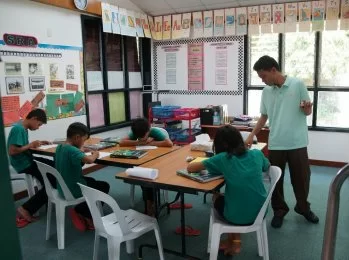 In my experience while teaching the kids at CCHS, I have undergone different emotions. Sometimes I feel happy and sometimes I feel mad or even guilty, but I try to not let that be a hindrance. I pray to the Lord that He will always guide me with the exact words and actions needed for the lesson I am going to share with my students.
In my experience while teaching the kids at CCHS, I have undergone different emotions. Sometimes I feel happy and sometimes I feel mad or even guilty, but I try to not let that be a hindrance. I pray to the Lord that He will always guide me with the exact words and actions needed for the lesson I am going to share with my students.
Can we do an experiment?!
It has been a joy for me to teach science for the older students at the Children of Hope School. Having recently graduated college specializing in science education, it has been an exciting adventure to be able to teach what I love. The students' love for science only makes me love my job even more! Everyday, they ask me, "Teacher Amanda, can we do an experiment?!" Whenever I say "Yes", their eyes widen with an eagerness to learn.
One of our latest experiments was making "oobleck" to explore the properties of matter. Oobleck is made of just corn starch and water, but when the ingredients are mixed together, it carries the properties of both solids and liquids! The students had a chance to get messy, have fun, and engage in scientific inquiry at the same time. With oobleck dripping from their hands, smiles stretched across their faces, and lightbulbs lighting up as their minds participated in active learning, I would say that our experiment was a success! By the end of the lesson, the students asked me a new question, "Teacher Amanda, can we do an experiment again tomorrow?!" What a delight it is to share my love of science with these young, bright, eager minds!
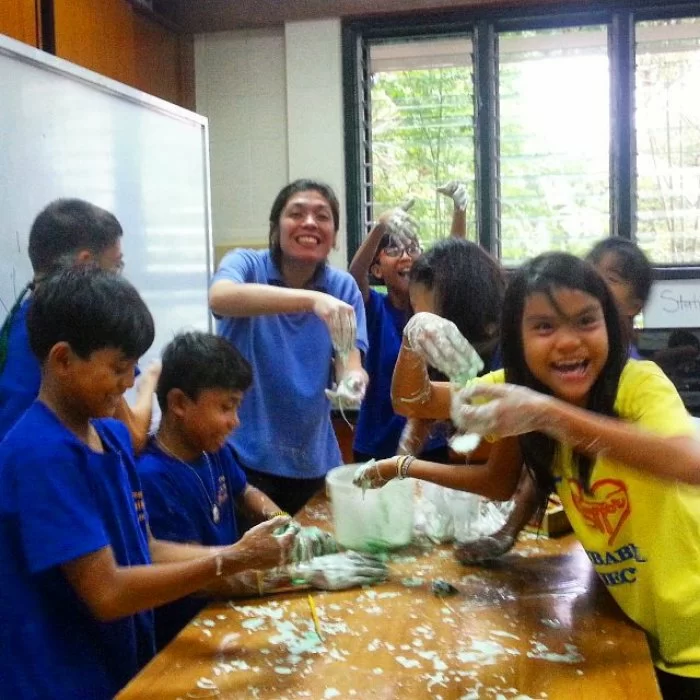
Reading Challenge: A First Experience
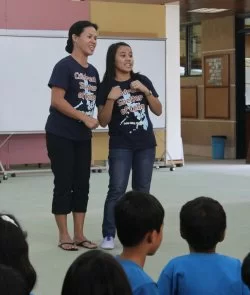
Well, this was the day I had been waiting for, the first all-school activity I was in charge of (along with Teacher Cora) in my new job as a teacher at CCHS. Teacher Cora and I were the facilitators of the Reading Challenge Kick-off, a contest that runs for six weeks to see how much everyone can read. The activity started with a prayer followed by a video presentation. Next was a short skit that really made me nervous. It was not easy to talk in front of the students since it was my first time to be in charge.
As the skit started,
the students were wondering where I was going because I was carrying a
bag.  I pretended I had come from the
library after borrowing books. Teacher
Cora asked questions about the books I had “borrowed.” Some of the kids were laughing and
cheering. I was still pretty
nervous. Then all the teachers started
singing a rehearsed song, “I Love Reading.”
The students joined in dancing and singing the song.
I pretended I had come from the
library after borrowing books. Teacher
Cora asked questions about the books I had “borrowed.” Some of the kids were laughing and
cheering. I was still pretty
nervous. Then all the teachers started
singing a rehearsed song, “I Love Reading.”
The students joined in dancing and singing the song.
Following the skit, each reading teacher announced the reading goals for the different classes. The students were mostly excited and a bit nervous themselves about meeting the goals. Games of “What’s the Word?” and “What’s Missing?” topped off the activities. The kids had to think hard and work together.
The event ended with lots of smiles on the kids’ faces. They showed their willingness to learn, read, discover and broaden their imagination through reading. They were ready to dive into reading good books! Reading more will help in shaping their futures.
Therapy Room Gets Dolled Up!
If you read Peter Arneson’s past blog about the Therapy Department, you will remember that we were in the process of taking out the Jacuzzi inside the therapy room. Uncle Jerry was taking a warm dip in the picture in the blog.
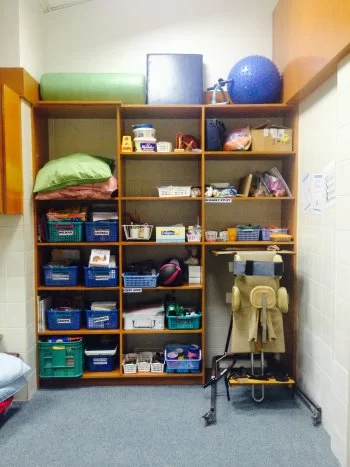
Well, we have removed the Jacuzzi and replaced it with more shelves. We also have new carpeting! During the process of remodeling, I contemplated putting in a sensory wall and a climbing wall for the benefit of most of the kids we service. With the help of Uncle Jerry’s team, we were able to put up a climbing wall and a sensory wall. The sensory wall consists of four panels: textures, gadgets, magnets and falling objects.
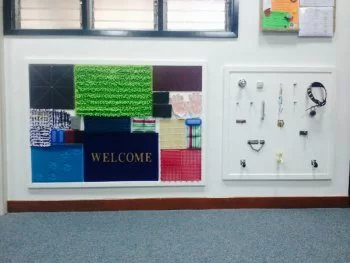
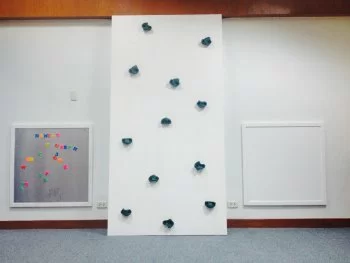 Some of the kids are already
enjoying the new digs! Take a look at our new therapy room.
Some of the kids are already
enjoying the new digs! Take a look at our new therapy room.
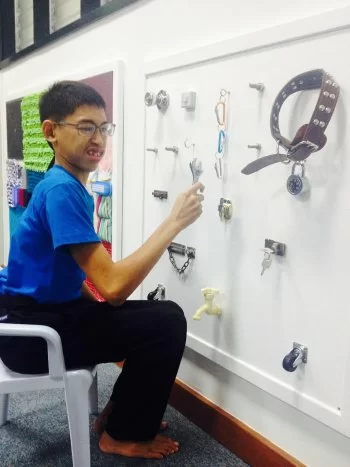
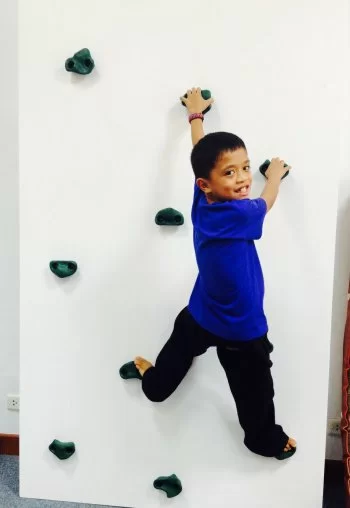
Do you have a birthmark?
Kind of a weird title for a blog I know, but it is something that I have been thinking about lately.
We had one of our CSC KIDS return for a visit last week. He is now 19 years old; he left CSC when he was about 19 months old. When we told his house parents and his caretakers that he was coming back to visit they all were excited to see him of course…no one is forgotten at CSC. One of the first things they talked about was his birthmark; he had a birthmark on one of his legs below the knee. They remembered him of course, but his birthmark was something that was special to him.
When he arrived we were all excited to see him, we recognized his smile and could see that little baby face that we remembered in the face of the young man with a mustache before us. We all glanced at his leg and did not see the birthmark we remembered so well…was this really our little guy? Finally, someone could not hold it in any longer; they asked him where his birthmark was. I wondered how he would handle that question; but he stood up, put his foot up on the chair, and pointed out a barely discernible scar right where we knew his birth mark should be. He explained that he had his birthmark removed when he was young because he did not like that people always noticed it. He thought it was wonderful that we remembered though, it brought a big smile to his face that we remembered something that was specific and individual to him. It gave him something positive out of something that he thought was negative. He almost seemed proud to show us the scar, he knew it was part of his identity, and the fact that we remembered proved to him that we DID remember him as an individual.
This little event made me think about the” birthmark” that many of us have, one that should be obvious for one and all to see. Do we let people see the “birthmark” that we have from our second birth; our birth into God’s family? This “birthmark” would be visible in our actions, our words, even our thoughts. I wonder if some of us would like to hide it and remove it. I wonder if some of us are embarrassed about it. I am sure that I have thought of doing all those things at different points in my life. Nevertheless, in the end, we know that this “birthmark” is the best thing we have ever been given. We can be proud of it and we need to show it to the world. I love birthmarks.





